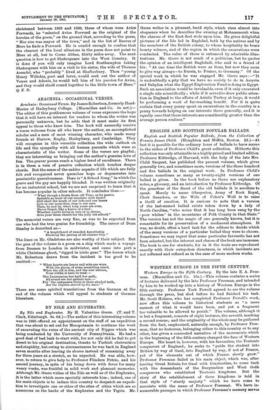By Nile and Euphrates. By H. Valentine Geere. (T. and
T. Clark, Edinburgh. 8s. 6d.)—The author of this interesting volume was in 1895 offered an appointment on the staff of an expedition that was about to set out for Mesopotamia to continue the work of excavating the ruins of the ancient city of Nippur which was being conducted by the University of Pennsylvania. He had a good deal of bad luck to start with, for not only did he fail to get direct to his original destination, thanks to Turkish obstruction and stupidity, but owing to circumstances he was back in England seven months after leaving its shores instead of remaining away for three years at a stretch, as he expected. He was able, how- ever, to return to give help to Professor Flinders Petrie, and his second journey, in spite of his being down with fever for many weary weeks, was fruitful in solid work and pleasant memories. Although Mr. Geere writes of the Nile as well as of the Euphrates, it is the latter which more specially interests him ; indeed, one of his main objects is to induce this country to despatch an expedi- tion to investigate one or other of the sites of cities which are so numerous on the banks of the Euphrates and the Tigris. Mr. Geere writes in a pleasant, lucid style, which rises almost into eloquence when he describes the evening at Mohammerah when the charms of the East first stole upon him. He gives delightful pictures of the life led in Baghdad, both by the natives and by the members of the British colony, to whose hospitality he bears hearty witness, and of the region in which the excavations were conducted. The value of these is enhanced by admirable illus- trations. Mr. Geere is not much of a politician, but he quotes the opinion of an intelligent Baghdadi, who said to a friend of his: "At one time the British were as lions, but now they seem to give way always—to Russia, to France, to Germany." Of the special work in which he was engaged Mr. Geere says:—"It is undoubtedly a pity that we have no society to do in Assyria and Babylon what the Egypt Exploration Fund is doing in Egypt. Such an association would be invaluable, even if it only excavated a single site scientifically ; while if it served to draw public atten- tion in England to the affairs of Asiatic Turkey at large, it would be performing a work of far-reaching benefit. For it is quite certain that every penny spent on excavations in the country is a penny towards helping on our interests there generally, and it is equally sure that those interests are considerably greater than the average person realises."






















































 Previous page
Previous page